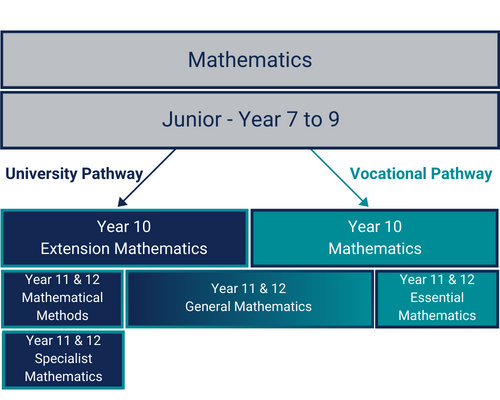Prerequisites
N/A
Corequisites
N/A
Subject Description
Essential Mathematics benefits students because they develop skills that go beyond the traditional ideas of numeracy.
Students develop their conceptual understanding when they undertake tasks that require them to connect mathematical concepts, operations and relations. They learn to recognise definitions, rules and facts from everyday mathematics and data, and to calculate using appropriate mathematical processes.
Students interpret and use mathematics to make informed predictions and decisions about personal and financial priorities. This is achieved through an emphasis on estimation, problem-solving and reasoning, which develops students thinking.
Weekly workload in hours
4+ hours
Structure
Number, data and graphs
| Money, travel and data
| Measurement, scales and data
| Graphs, chance and loans
|
Fundamental topic: Calculations
| Fundamental topic: Calculations
| Fundamental topic: Calculations
| Fundamental topic: Calculations
|
Number
| Managing money
| Measurement
| Bivariate graphs
|
Representing data
| Time and motion
| Scales, plans and models
| Probability and relative frequencies
|
Graphs
|
Data collection |
Summarising and comparing data |
Loans and compound interest |
Assessment
In Units 1 and 2 students complete four formative assessments with an overall subject result (A-E). In Units 3 and 4 students complete four summative assessments. Schools develop three summative internal assessments and the common internal assessment (CIA) is developed by the QCAA.
Summative assessment
Summative internal assessment 1 (IA1): Problem-solving and modelling task | Summative internal assessment 3 (IA3): Problem solving and modelling task
|
Summative internal assessment 2 (IA2): Common internal assessment (CIA) | Summative internal assessment 4 (IA4): Examination
|

